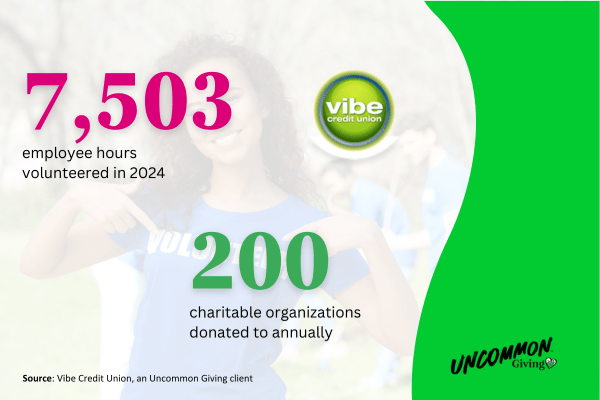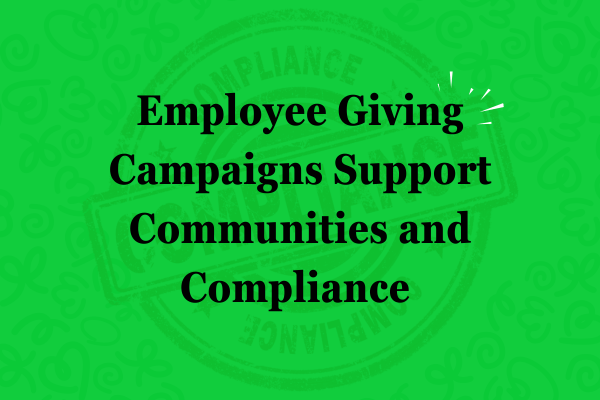As a business leader, you’ve likely been told to invest in corporate social responsibility (CSR). You’ve heard about how it makes employees happier, improves your reputation, and is becoming more and more of a necessity for companies everywhere. But you might hesitate to tap in, whether you’re not fully convinced or don’t think you have the resources to create a successful program.
We’re here to tell you that you do! You can launch a successful CSR program at any size—trust us, we help companies of all kinds amplify their social impact every day.
In this beginner’s guide, we’ll walk through everything you need to know about CSR, including step-by-step instructions for developing a program that works for your unique business. Here’s what we’ll cover:
- What is Corporate Social Responsibility?
- Why Consider CSR?
- Core Benefits of Corporate Social Responsibility
- 4 Types of Corporate Social Responsibility
- What CSR Looks Like for Small Businesses
- Creating Your Business’s CSR Strategy
- Successful Corporate Social Responsibility Examples
Corporate social responsibility isn’t a trend—it’s exactly what it sounds like, a responsibility. Let’s dive in so you can start fulfilling yours.

What is Corporate Social Responsibility?
Corporate social responsibility (CSR) describes businesses’ efforts to make a positive impact on society and the environment. It involves voluntarily taking responsibility for how your company impacts your community and the world. Once you’re aware of your impact, CSR requires taking tangible steps to address it.
In practice, CSR can take many forms. You might reduce your carbon footprint, support local communities, or adopt more ethical business practices. Or, you could commit to donating a portion of your profits to nonprofits. Many companies also offer sponsored volunteering opportunities to amplify their team’s generosity.
No matter how you use it to make an impact, the ultimate goal of a CSR program is to help you create a sustainable business that positively impacts both your company and the world.
Why Consider CSR?
We understand if you’re not completely sold on the idea of CSR yet. Given that this wasn’t always part of a successful business strategy, it makes sense that you’d have questions like these:
- Why should our team consider CSR?
- Is it really an important part of our company’s growth strategy?
- Can’t we treat it as a nice-to-have discussion to save for a future date?
You tell us. The latest research on corporate social responsibility shows:
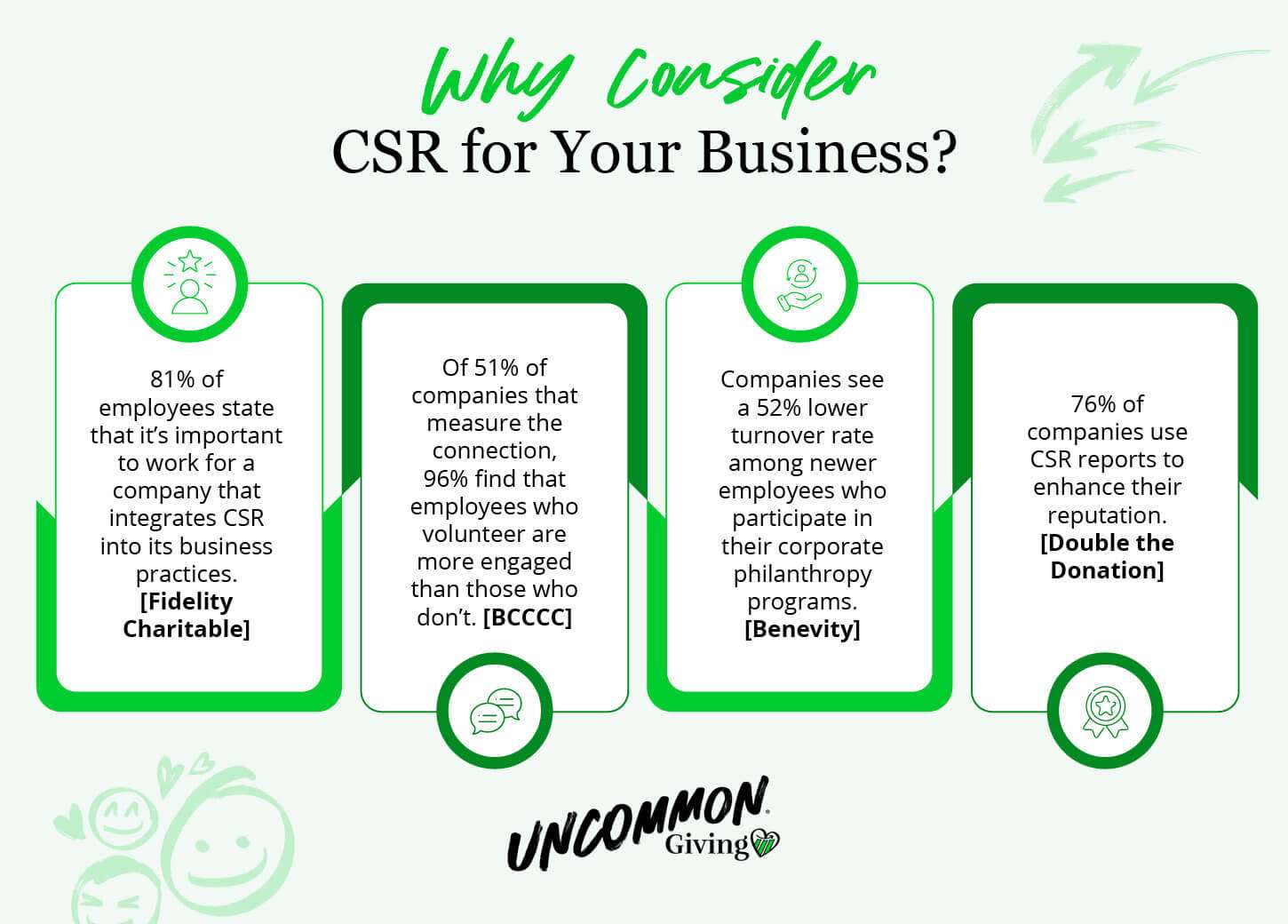
- 81% of employees state that it’s important to work for a company that integrates CSR into its business practices.
- Of 51% of companies that measure the connection between volunteerism and engagement, 96% find that employees who volunteer are more engaged than those who don’t.
- Companies see a 52% lower turnover rate among newer employees who participate in their corporate philanthropy programs.
- 76% of companies use CSR reports to enhance their reputations.
These statistics prove that CSR has positive impacts on both employees and businesses, but the list of reasons to invest in CSR goes on. Let’s break it down further.
Core Benefits of Corporate Social Responsibility
With a strong CSR program, your company can expect benefits like:
Increased Social Impact
Businesses already have a significant impact on society and the environment. By taking responsibility for that impact, you can help address important issues and support the creation of a more just world where everyone can thrive.
Specifically, when you facilitate employee giving and volunteering opportunities and implement a system to manage your program, your company will be set up to do more good than ever before. With streamlined tools at your fingertips (more on that at the end of this post!), you’ll also have a way to measure that impact and communicate it transparently with employees and outside stakeholders.
Improved Reputation for Your Brand
Companies with strong CSR practices tend to have better reputations and more positive relationships with their communities. These ties can lead to better financial outcomes long-term. Why? Your corporate social responsibility efforts may give your company a competitive edge when selling your product or service.
Plus, the positive press or word of mouth your CSR efforts generate can help your company reduce potential risks (legal, reputational, etc.).
Stronger Company Culture
Creating a program centered around generosity helps strengthen your relationship with employees and facilitates social connection for team members, ultimately improving company culture.
You can use the program to invite more employee input and increase their involvement in the company, which shows that you care about them beyond their part in meeting your company’s bottom line. This is especially important for recruitment and retention, as research shows that 71% of employees surveyed say it’s imperative or very important to work where the culture supports giving and volunteering.
A strong CSR program also highlights your company’s values, helping both employees and external stakeholders connect more with your business. Your values should be more than just words on your website. Part of improving your company culture is showing how you live your values. By implementing them in CSR programs and involving employees in that implementation, you’re showcasing your core values and bringing them to life.
Higher Rates of Employee Satisfaction and Retention
Since employees want to work for companies that align with their values, promoting CSR naturally attracts strong candidates and helps retain your top employees. It also improves your bottom line, as you’ll likely see an increase in employee productivity when they’re more satisfied with their work.
People want to make an impact, and they also want their current or future employers to prove that they’re making the impact they say they are. The right CSR platform will help you generate the reports you need to keep employees engaged.
Increased Customer Loyalty
Finally, living out your company’s values through public CSR efforts makes customers trust your brand and want to continue doing business with you. The results? A potential 28% increase in overall customer loyalty.
Now more than ever, customers want their dollars to go toward businesses that will put them to good use. When you prove that your company uses profits to help communities rather than harm them, customers will be more willing to spend more, buy your products more often, and remain loyal to your brand long-term.

4 Types of Corporate Social Responsibility
Now that you know the “why” behind corporate social responsibility, let’s get into the “how.” There are a wide variety of ways companies implement CSR practices, but they generally fall into one of four categories:
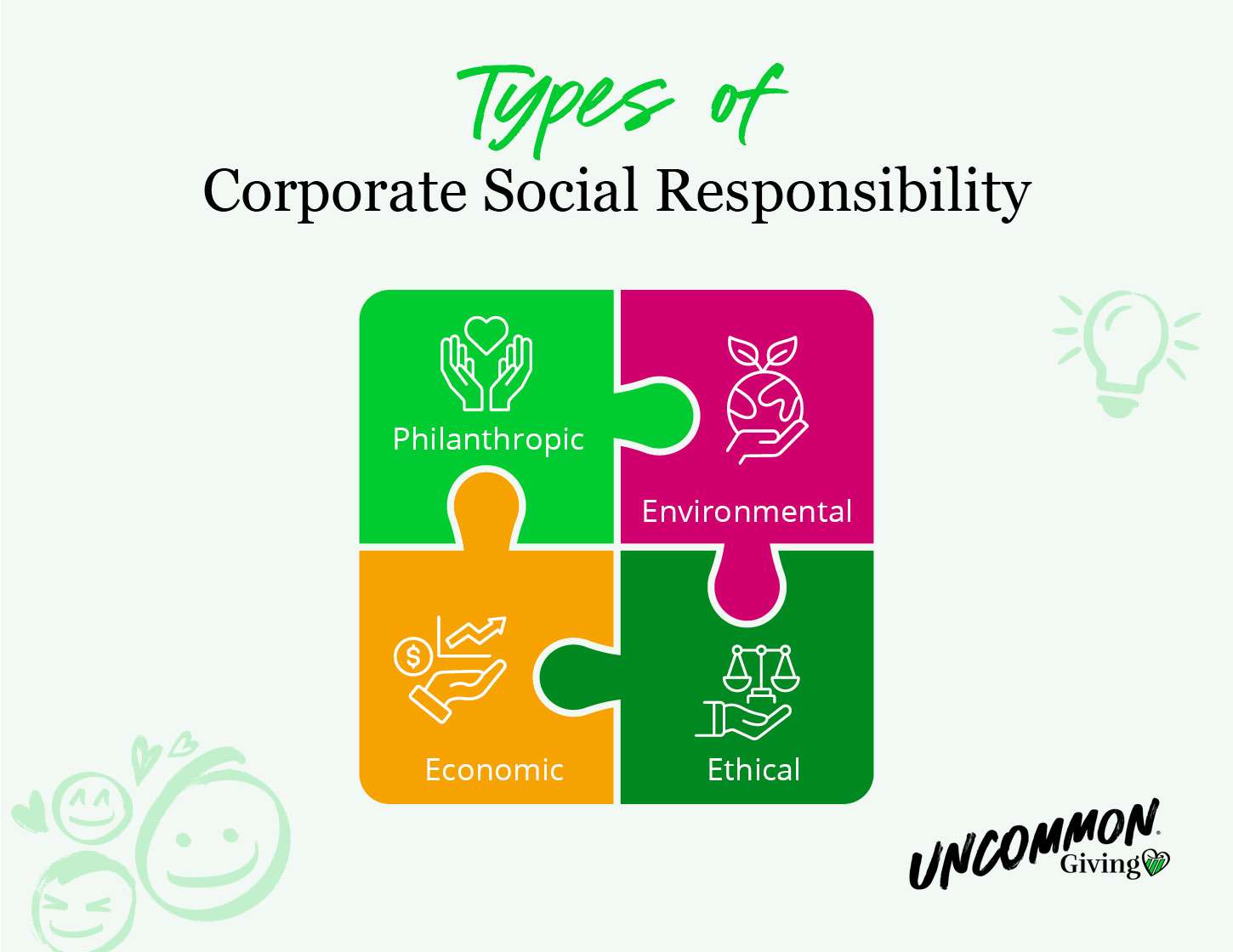
- Philanthropic: These CSR programs focus on positively impacting communities by donating money and/or volunteer time to relevant causes and nonprofit organizations. Workplace giving initiatives often include employee-driven efforts and donations made at the executive level.
- Environmental: Also known as environmental stewardship or sustainability efforts, this type of CSR aims to improve companies’ environmental impact. You might implement new practices to reduce harm, give back to the land, reduce your carbon footprint, etc.
- Ethical: Ethical CSR involves ensuring your company’s labor practices treat everyone with the respect they deserve, including your employees, contractors, and any outsourced labor your business uses.
- Economic: Factoring social good into your company’s financial decisions is known as economic CSR. Typically, this means investing some of your profits back into the community, remaining financially transparent, and ensuring your investments support other companies committed to corporate social responsibility.
Your business’s CSR programs may focus on one or all of these types, depending on your resources and what resonates most with your employees. However, for companies that are just starting out, we recommend prioritizing philanthropic CSR first.
Giving programs are easy to set up with the right support, produce clear, measurable impacts, and appeal to a wide range of employee and stakeholder interests. Plus, many philanthropic CSR programs let employees take the wheel—they can choose what causes to donate to, which organizations to work with, and how they want to make an impact with your company’s help.
What CSR Looks Like for Small Businesses
You may be thinking, “This all sounds great, but we just don’t have the money or bandwidth for corporate social responsibility.” We understand the challenges small businesses face regarding CSR—limited budgets, reluctance to commit resources, difficulty engaging employees, and more. However, we also know it’s not only possible but well worth the effort.
The key is to remember that your corporate social responsibility doesn’t have to look like what Google or Microsoft does. Small and mid-size businesses can drive significant social impact in their own communities, in their own ways.
Often, this starts with a few basic corporate philanthropy programs. We’ve seen small businesses find great success with programs like:
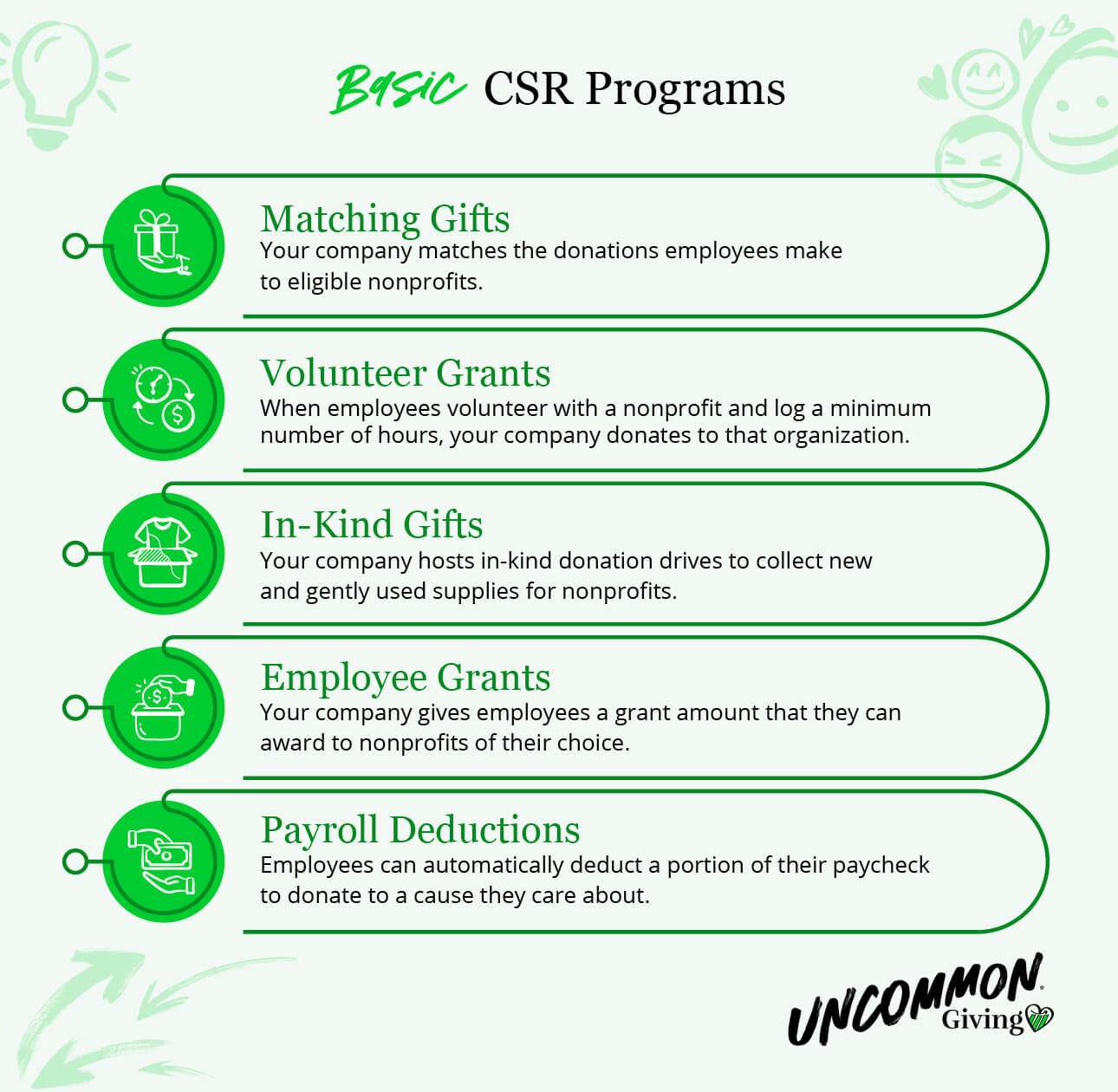
- Matching gifts: Your company matches donations that employees make to eligible nonprofits. For instance, if a team member gives $50 to an animal shelter, you’ll give an additional $50 for a combined contribution of $100.
- Volunteer grants: Also known as Dollars for Doers, this program involves donating money to organizations your employees volunteer with for a minimum number of hours.
- In-kind gifts: Instead of contributing money, your company might host in-kind donation drives to collect new and gently used supplies for nonprofits. Think canned food drives, clothing drives, donating surplus products, etc.
- Employee grants: Your business gives employees a certain grant amount they can award to nonprofits of their choice. These might be charitable spending accounts (CSAs) or one-time grants as an employee appreciation method.
- Payroll deductions: Give employees the option to automatically deduct a portion of their paychecks to donate to a cause they care about. This way, they can commit small monthly or biweekly donations to their favorite organizations.
Each of these programs is employee-led, meaning your leadership won’t have to devote significant time to making philanthropic decisions. All you need to do is set guidelines, manage the logistics of disbursing funds, and encourage employees to participate. Program management and administration is where most small businesses hesitate, but we’ve got an answer for that, too: Uncommon Giving’s easy-to-use CSR platform.
How Uncommon Giving Can Help
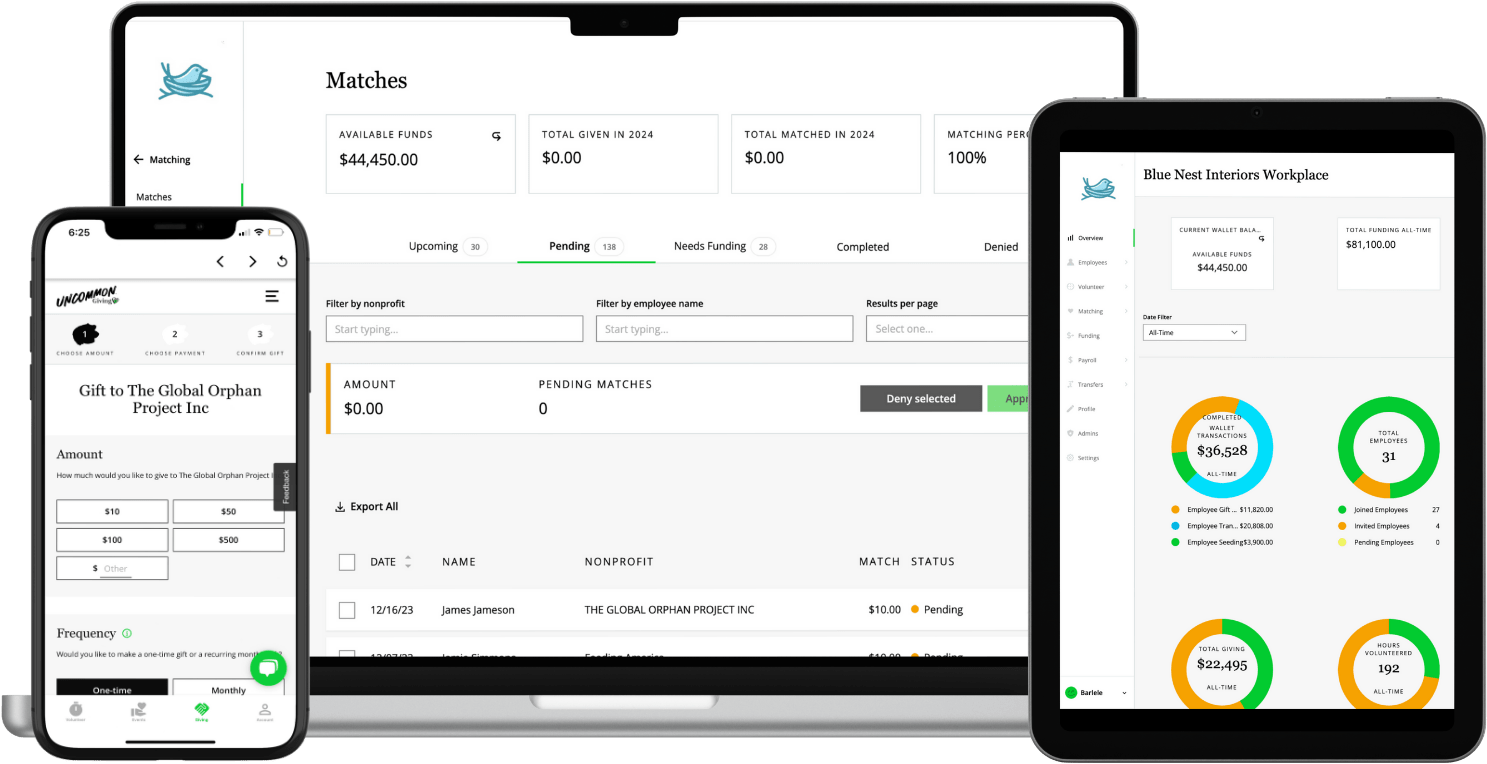
The best software is the kind that you look forward to using, and that’s the Uncommon Giving platform. It’s fun, intuitive, and helps you achieve your CSR goals with minimal effort. It also saves you and your team valuable time so you can focus more on your program’s mission than administrative work.
Our platform makes corporate giving accessible for small businesses and employees everywhere. Clients choose Uncommon Giving because they don’t have to pay any setup fees, can onboard quickly (deploy in less than 24 hours!), and can see the results of their corporate social responsibility efforts firsthand.
With Uncommon Giving, you’ll get:
- A giving wallet for each employee where they can add funds and distribute them to charities of their choice at any time.
- Personalized employee giving experiences that include popular options like matching gifts, volunteering opportunities, payroll deductions, and more.
- Instant access to nonprofits so employees can find organizations to support with ease.
- Easy process automation to make managing CSR programs simple and less time-consuming.
- Automated, low-overhead disbursements so your admins don’t waste time manually processing donations or managing complex spreadsheets.
- Measurable social impact displayed via real-time, configurable dashboards that you can share with stakeholders.
Also good to know: To help nonprofits attract donors, Uncommon Giving makes it easier for your employees to reach nonprofits and manage their charitable donations. Learn more about how we work with nonprofits to drive all parts of the philanthropic ecosystem.

Creating Your Business’s CSR Strategy
Ready to launch your own corporate social responsibility program and access all the benefits that come with it? To get started, follow these steps:
- Determine your budget and goals. Work with your company’s leadership team to set a realistic budget and outline what you want to accomplish with your new program. Don’t forget to include the cost of CSR software in your budget!
- Choose impactful CSR programs. Determine whether you want to invest in philanthropic, environmental, ethical, or economic CSR. Then, choose specific programs to implement, such as matching gifts or employee volunteering.
- Set company guidelines. Set parameters for each program you chose, outlining exactly which employees and nonprofits are eligible to participate and how much money your company will contribute in different circumstances.
- Implement intuitive CSR software. Purchase and set up a CSR platform to streamline your efforts and greatly reduce the time needed to manage your new programs. Customize any relevant elements of the platform to align with your unique needs.
- Encourage and track employee participation. Finally, announce your new corporate social responsibility program to employees and encourage them to participate. Use your software to monitor participation regularly and see which aspects employees enjoy most.
As employees engage with your new CSR program, don’t be afraid to shift gears and make changes based on their feedback. Based on participation data, survey results, and conversations with team members, ensure your programs are meaningful and accessible to employees.
Successful Corporate Social Responsibility Examples
Looking for inspiration for your program? Explore these real-life examples from companies across industries.
Omatic: Gamified Giving
Omatic Software is a nonprofit software provider that prioritizes philanthropic giving and employee engagement in its CSR program. Along with matching gifts and executive giving, this company offers a specialized giving program called “Passion Projects,” where employees compete to win corporate funds for their favorite cause or organization.
By gamifying part of its CSR efforts, Omatic encourages participation and ultimately increases its social impact.
Vibe Credit Union: Vibrant Volunteering
Operating in the financial sector, Vibe Credit Union’s mission is to “elevate community and create opportunity” by removing barriers to financial wellness. To support this mission, the credit union offers multiple philanthropic CSR programs through which the business donates time and money to over 200 nonprofits. Employee volunteering is a major part of this company’s efforts.
In 2023, Vibe employees volunteered for over 2,500 hours, participating in an array of volunteer events and projects across cause areas.
The Rounds: Simplifying Sustainability
The Rounds was created to make grocery delivery more sustainable, so this business naturally prioritizes environmental CSR in its daily operations. By sourcing food and other essentials from local vendors, packaging items in reusable containers, and encouraging customers to return their empty containers, this company embodies sustainability.
Through The Rounds’ sustainable delivery service, the company reports saving over one million points of waste from single-use packaging.
Wrapping Up: Dive Deeper into Corporate Social Responsibility
Corporate social responsibility is a crucial concept that businesses of all sizes and industries should embrace. By taking responsibility for your impact on society and the environment, your company can help create a more just and sustainable world and receive a high return on investment that will help your business grow.
To learn more about the world of CSR, check out these resources:
- 11+ Best CSR Software for Impact, Engagement, and ROI. The right solution makes implementing and managing CSR programs a breeze. Explore the top options in this guide.
- Employee Giving 101: A Blueprint for Modern Companies. Philanthropy is the easiest way to get started with corporate social responsibility. Learn how to create engaging, impactful giving programs that employees love.
- Donation Matching: The Only Guide You Need to Get Started. Discover one of the most popular CSR programs: matching gifts. This guide covers all the basics and tips for launching your own donation matching program.






